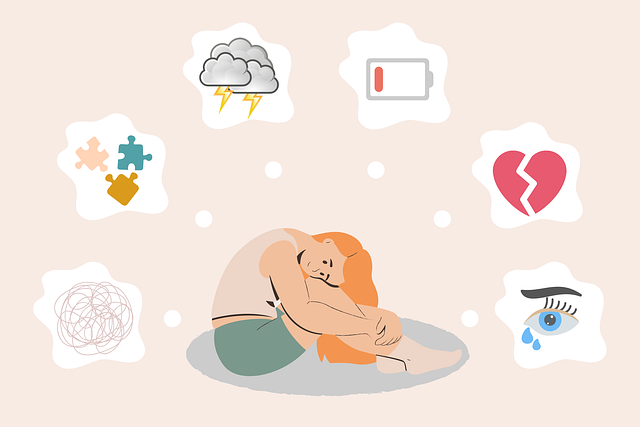The text discusses the significant impact of mental illness stigma, leading to social isolation and discrimination. It highlights how Colorado Springs Anger Management Therapy offers a unique approach by focusing on anger as a visible symptom, empowering individuals through self-awareness and emotional regulation skills. The program contributes to stigma reduction via community engagement, educational initiatives (like workshops and risk assessment tools), and peer support groups. These efforts are backed by policy changes improving therapy accessibility and affordability in Colorado Springs, transforming the mental health landscape.
Mental illness stigma reduction is a crucial step towards fostering healthier communities. This article explores various initiatives aimed at dismantling societal barriers, focusing on Colorado Springs Anger Management Therapy as a pioneering approach. We delve into understanding the profound impact of stigma and its effects on mental health. Additionally, educational programs, peer support, policy reforms, and community awareness efforts are discussed, highlighting their role in creating a more inclusive environment. By addressing these aspects, we can revolutionize mental healthcare accessibility.
- Understanding Stigma and Its Impact on Mental Health
- Colorado Springs Anger Management Therapy: A Key Component in Stigma Reduction
- Educational Initiatives for Community Awareness
- Peer Support and Advocacy: Empowering Those Affected
- Policy Changes and Their Role in Creating a More Supportive Environment
Understanding Stigma and Its Impact on Mental Health

Stigma surrounding mental illness can have profound effects on individuals’ well-being and willingness to seek help. It often manifests as negative attitudes, beliefs, and stereotypes about people with mental health conditions, leading to discrimination and social isolation. In Colorado Springs, Anger Management Therapy has been a significant tool in combating this stigma by providing a safe space for individuals to understand and manage their emotions effectively. Such therapeutic interventions play a crucial role in fostering empathy and breaking down barriers.
Moreover, understanding the impact of stigma is essential in developing strategies like Risk Management Planning for Mental Health Professionals. By recognizing the challenges faced by those with mental health issues, compassion cultivation practices can be integrated into various settings. These practices promote kindness, active listening, and emotional awareness, which are vital in creating supportive environments. Additionally, initiatives focused on Depression Prevention should consider stigma reduction as a core component, ensuring that individuals feel encouraged to seek support without fear of judgment.
Colorado Springs Anger Management Therapy: A Key Component in Stigma Reduction

In the fight against mental illness stigma, Colorado Springs Anger Management Therapy stands out as a powerful tool. This specialized therapy program targets one of the most common and visible symptoms of mental health struggles: anger. By addressing and managing anger effectively, individuals can reduce impulsive behaviors and communicate their needs in healthier ways, fostering better relationships and community engagement. This, in turn, contributes to breaking down barriers and stereotypes associated with mental illness.
Colorado Springs Anger Management Therapy is not just about controlling rage; it’s a holistic approach that integrates Self-Care Routine Development for Better Mental Health and Mental Wellness Coaching Programs. Participants learn self-awareness techniques, stress management strategies, and emotional regulation skills, empowering them to navigate challenging situations with resilience. Through these practices, individuals can cultivate a sense of empowerment and begin to view their mental health as a journey of growth and healing rather than a source of shame, thereby significantly contributing to stigma reduction efforts.
Educational Initiatives for Community Awareness

Educational initiatives play a pivotal role in reducing the stigma surrounding mental illness within communities. Colorado Springs Anger Management Therapy, for instance, has been at the forefront of such efforts by offering programs that not only address specific issues like anger but also foster open dialogue about mental health. These educational outreach programs often include workshops, seminars, and community gatherings where professionals and individuals share their experiences to demystify various mental health conditions.
One effective strategy is incorporating mental wellness journaling exercises guided by trained facilitators. This practice encourages participants to reflect on their emotional well-being and promotes self-awareness. Additionally, risk assessment tools for mental health professionals help in early identification of potential issues, enabling timely interventions. By integrating Stress Reduction Methods into these educational initiatives, communities can create a more supportive environment where individuals feel empowered to seek help without fear of judgment.
Peer Support and Advocacy: Empowering Those Affected

Peer support and advocacy play a pivotal role in reducing the stigma surrounding mental illness. By fostering connections between individuals with personal experiences, peers can offer unique understanding, empathy, and encouragement. This form of support is particularly powerful as it challenges stereotypes and promotes acceptance within communities. In Colorado Springs, for instance, peer-led groups focused on anger management therapy have shown significant success in helping individuals manage their conditions while fostering a sense of belonging.
Advocacy efforts further strengthen the movement by amplifying the voices of those affected, advocating for policy changes, and driving public awareness campaigns. These initiatives contribute to the development of more comprehensive crisis intervention guidance, ensuring better support systems are in place. Through open dialogue, education, and community engagement, the stigma associated with mental health issues can be gradually dispelled, paving the way for improved access to care and enhanced well-being for all.
Policy Changes and Their Role in Creating a More Supportive Environment

Policy changes play a pivotal role in fostering a more supportive environment for individuals grappling with mental illness. In many regions, including Colorado Springs, where access to Anger Management Therapy has been increasing, legislative reforms are instrumental in reducing the stigma associated with seeking help. These policy shifts often include improved insurance coverage for mental health services, ensuring that therapy and counseling become more financially accessible. By removing financial barriers, policies encourage individuals to prioritize their mental wellness and seek necessary support.
Additionally, regulatory bodies are implementing guidelines for emotional regulation techniques and risk assessment training for mental health professionals. Such measures enhance the quality of care, instill public trust, and underscore the importance of addressing mental illness proactively. Colorado Springs’ growing focus on these policy initiatives demonstrates a commitment to creating a community where individuals feel empowered to manage their emotional well-being without fear of judgment or discrimination.
Mental illness stigma reduction is a multifaceted approach that includes therapy, education, peer support, and policy changes. As highlighted by initiatives like Colorado Springs Anger Management Therapy, targeted interventions can significantly impact communities. By fostering awareness through educational programs and empowering those affected through peer advocacy, we can create a more inclusive and supportive environment. Policy reforms play a crucial role in eliminating discrimination and ensuring access to quality care for all. Together, these efforts can lead to improved mental health outcomes and a reduced stigma surrounding mental illness.














